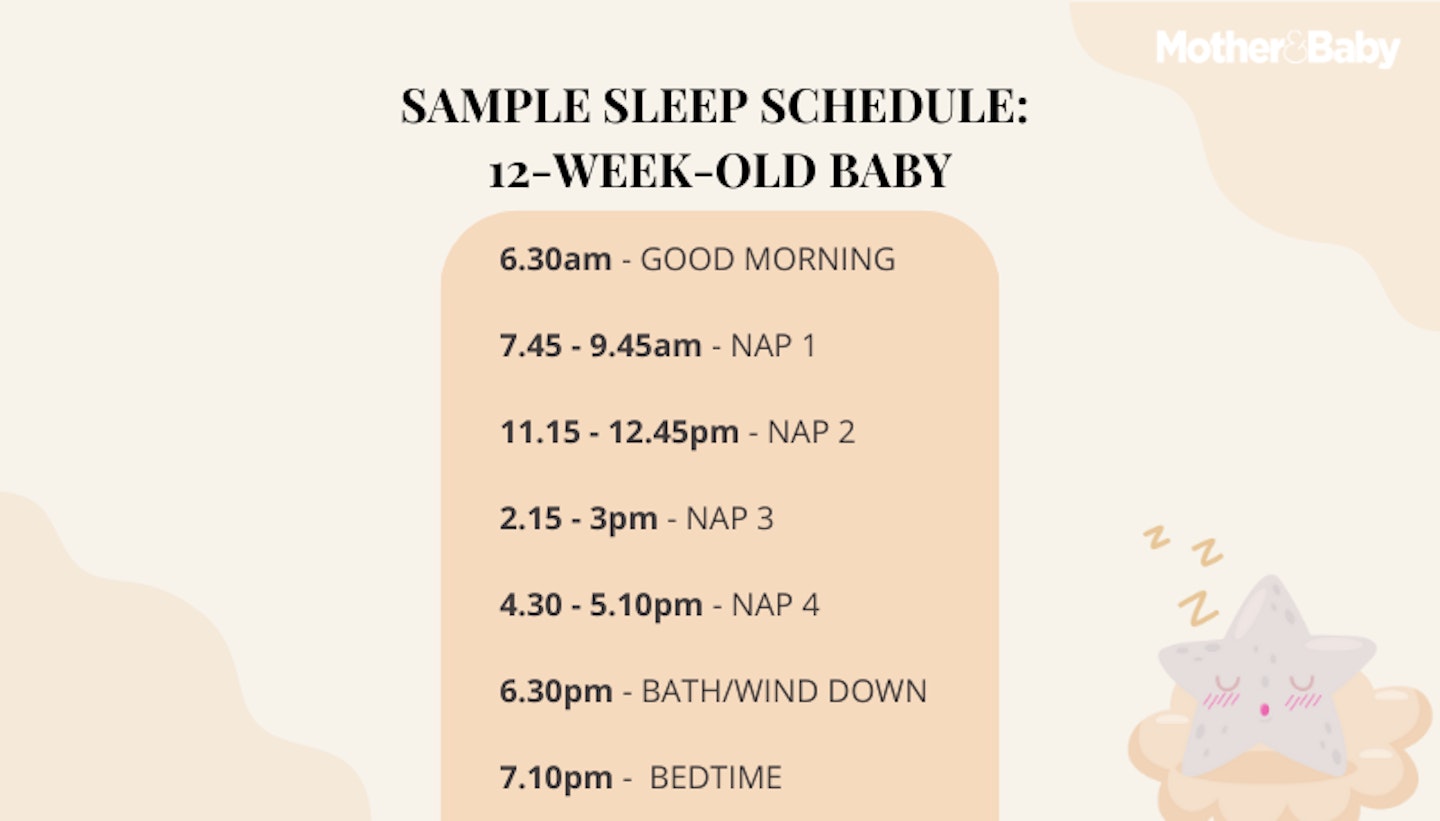Congratulations, you now have a 12-week-old baby on your hands! We bet the weeks have flown by, with your baby developing a little personality and meeting a few new and exciting baby development milestones - including smiling and cooing! This week, watch out for another baby growth spurt and more immunisations. Here you can find out more about week-by-week baby development and what to expect when your baby is 12 weeks old.
What is 12 weeks in months?
Even though you still can't believe it, your little bundle of joy has been in your life for three whole months and are officially now out of the newborn phase. According to medical professionals, the newborn phase typically lasts for eight weeks in total, but it can be up to three months. After this period, your baby will usually be referred to as a baby or an infant up until they're around 1 year of age. It is also the last time your baby's growth will likely be referred to in weeks, from now on it is all about months.
Development milestones for 12-week-old baby
Growth Your three month old baby has grown about an inch per month to a total of three inches since they were born! They’ve also probably gained about three pounds, although it varies from baby to baby. Like with week 11 of baby's development, you’ll probably be in for another growth spurt this week, which means crankiness, restlessness and feeding more. Your baby may be starting to settle down more in general, but a baby growth spurt and growing pains could set this back briefly. If you're breastfeeding, they will probably be hungrier and feed more often, but don't worry, everything will go back to normal in a few days. Dr. Costa advises, "weight varies from child to child, but at 12 weeks they tend to put on roughly 20 grams per day. Soon they will reach twice their birth weight."
Language If you haven't heard your little one's adorable laugh yet, it is on its way. Babies normally begin laughing between 3 to 4 months of age. At 12 weeks, you may start to hear your baby coo and giggle, which normally comes first to proper belly laughs.
Smiling Your 12-week-old baby is full of smiles at this point, which is possibly the cutest thing in the whole world. They will be moving on from reflux smiles now and will be really grinning at their favourite people and things.
Hearing At 12 weeks, your little one's hearing is well developed and they are starting to react to certain sounds. They will often smile and coo at the sound of your voice, so never stop talking and singing to them - even if they can't reply yet. They might also start following objects with their eyes and turn their heads to look in the direction of sounds.
Physical As their little body fills out and straightens up, you’ll notice your baby gaining more muscle control and their movements are less jagged. They might even be pushing themselves up when they lie on their tummy. Dr Costa, a Senior Paediatric Consultant at The Children's Allergy Clinic says, "your little one will start lifting their head, extending their arms and discovering/ inspecting their hands. They will start to reach towards objects and may wave towards their toys." If they need improvement here, try laying down with them as they play and encourage them to look up at you. Tummy time is important, so spend a few minutes each playtime on your tummy with your little one and then build this up to 15-20 minutes.
Muscle control and hand-eye coordination It’s also a great time to play with wrist rattles and noisy toys, even if your baby didn’t like them a few weeks ago – these toys help your baby’s hand-eye coordination and muscle control. Choose a brightly coloured rattle to engage their vision too, and look for how they react when they make the rattling sound.
12-week-old cognitive development
Cause and effect With their movements becoming more controlled, your baby is starting to understand cause and effect. They’ll start to realise that kicking and punching things, or grabbing at toys, means they move. Dr Costa says, "your baby’s Moro reflex (where they are startled and feel like they are falling) should have disappeared by this stage." He also adds, "babies enjoy music even when they are in the womb, but you will see them visibly enjoy music and social interactions with you at this age. They will also start to make ‘ahh’ sounds."
Tummy time Your baby will be getting stronger day by day and and will start to make small movements during tummy time. Tummy time is so important, even just for short amounts each day. As their little body fills out and straightens up, you’ll notice your baby gaining more muscle control and their movements are less jagged. Tummy time is a great way to help them keep working on this newfound strength as they can practice holding themselves up.
Skin to skin Week 12 is a good week to improve your baby’s sense of touch with more skin-to-skin contact. Try baby massage, it also increases bonding and can help their digestive system.
12-week-old baby sleep

Lucy Wolfe, from Sleep Matters, says "night time sleep configuration becomes organised around 12 weeks, this does not mean that they will sleep through per se, but this means that day and night time sleep is more structured and this speaks to a sleep need overnight of about 10.5-12 hours. It is realistic that many children will still require night time feeds for many more months to come, but that bedtime has potentially become earlier and we are now also observing an earlier wake time." Sleep patterns are different for every baby but there are certain things you can expect between three months and twelve months old. In terms of daytime sleep, Lucy says, "day time sleep is not as organised yet in terms of duration, but with the emergence of night time, you will require a series of day time sleeps, with no great emphasis on duration just that your child appears well rested and what you are doing seems to suit you all." It’s important for babies to continue to nap during the day; not only will this help your baby sleep well at night but it’s also good for their brain development.
Baby sleep is a problem for many new parents. It can take you a while to understand your baby's sleep patterns and get them into a routine. If you're having ongoing issues with sleep, there are certain tips and tricks you can use to get them snoozing. Lucy says "parents can continue to attune to their baby's sleep language, looking for sleep cues such as brief eye rubs, and yawns and avoid intense symptoms as well. They can also introduce both a bed, and nap time, pre-sleep ritual to further help with the transition to sleep. For those parents who would like to encourage an independent style of sleep, it is by this age that I would encourage the percentage of wakefulness approach. This means, helping your baby to be gradually more awake when transferred to their sleep space at bedtime. This activity can help them to develop a level of sleep ability and thereby transition through the natural sleep phases that emerge more clearly by 16 weeks onwards." You can also try boosting your baby's sleep hormone naturally to help regulate their body clock with the help of sunlight.
With regards sleep and night feeds, Lucy advises, "it is possible at this age onwards that you will see them be able to go longer between feeds, and take more when offered as well. Their feeding requirement will still likely be in a 24 hour time period. I do not suggest any attempts to reduce night feeds as they will be required until 7months or so and longer for many."
Below is a sample sleep schedule for an 12-week-old baby that assumes your baby naps four times a day. This is just for a day sleep schedule, not nighttime, where your baby will still wake for feeds.

Feeding and nutrition for your 12-week-old baby
Now that your baby is becoming an expert in feeding, they will finish much faster, sometimes in as little as 5-10 minutes. For the next few weeks, your baby may start to become distracted during feeds, this will peak at around four months old. While your baby will be sleeping better through the night, they’ll still wake up a couple of times for night feeds.
Dr Costa says, "at this age your baby is either exclusively breastfed, mixed-fed or bottle-fed. If your baby is bottle-fed they should keep having 150 ml/kg/day of formula. For a breastfed or mixed baby, you should see around six wet nappies a day, which will show the baby is not only well hydrated but also feeding the right volume. They should be feeding every three to four hours, with some spacing at night. The number of dirty nappies will vary as long as the consistency of the stool is soft and seeded."
If you’re worried about your baby’s weight or feeding patterns, you can discuss this with your health visitor or book an appointment with your GP.
Health and safety tips for an 12-week-old baby
Nappy changes Over the past 12 weeks, you’ll probably have seen every kind of nappy imaginable, and the nappy checking doesn’t end yet! When it comes to baby poo, the spectrum of normal is pretty varied – your baby could be pooing after every feed or once every few days. As long as your baby isn’t in pain whilst filling their nappy, all is well. If they do seem uncomfortable, they may be constipated and need to see a doctor.
12-week jabs It's that time again, your baby's second immunisation appointment should happen around this week.
At their first appointment, they received their first dose of the 5-in-1 injection against diphtheria, tetanus, whooping cough, polio and Hib (Haemophilus influenza type B). The 12-week immunisation will give your baby a second dose of this injection, plus another dose of the Rotavirus vaccine (a liquid dropped straight into their mouth). You may be expecting a meningitis C vaccine for your 12-week-old baby, but thanks to the success of the immunisation programme here in the UK, this jab was discontinued in July 2016.
Infections Dr Costa advises that at 12 weeks "your baby is likely to catch several viral infections, occasionally developing bronchiolitis, so expect plenty of coughs and colds. Bacterial infections are very uncommon, with Strep A being the most common bacterial infection."
Flat Head Syndrome If your baby doesn’t like tummy time, or they’re spending a lot of time on their back, you’ll need to look out for a flat spot on the back of their head. This can be managed easily so don't worry too much.
Growing pains Despite your baby finally settling down, it’s also normal for some babies to become crankier with their three-month growth spurt. All that growing takes its toll and they may become restless and cry more. Just know it’s all normal, and will subside when their growth spurt comes to an end.
Practical parenting tips - looking after yourself
The aptly named fourth trimester is one of the most difficult things to adjust to for any parent. Those first 6 to 12 weeks have likely taken a huge toll on you, so it’s time to celebrate making it through the sleepless nights. Make sure you give you and your partner some alone time, you both deserve it!
Postnatal Depression Postnatal Depression can occur at any time in the first year of your baby’s life. Are you overwhelmed by guilt or feelings of failure? Do you feel like everything could go wrong and it’s all your fault? You may want to visit your doctor and talk about the possibility of postnatal depression. With one in ten women dealing with it, you’re definitely not alone.
Preparations for the next stage
Dr Costa advises that parents can "start preparing for your baby’s introduction to solid foods, which can start at between four and six months of age." He adds, "starting with solids at four months can give an indication of any allergies - especially if your baby has eczema or there is an older sibling with allergies."
He also says that parents should "focus on your baby’s developmental milestones and growth. Measuring and recording your baby’s growth in their centile chart which you can find in their red health book, will help to track your child’s development." Finally he adds, "discuss any concerns with your health visitor and if something is not right, seek advice from your GP as soon as possible."
There are lots of things you start to try with your little one as they begin to engage more and Dr. Costa suggests parents can "chat, sing and play songs to your baby and make fun, facial expressions from both their left and right side." Also, try "holding your baby horizontally (ventral position), being careful to fully support them under the chest and trunk, to aid neck and head control." Also, he advises that you can "lie your baby on their back and place hanging toys above them to help them focus their attention. They might even try to reach for their toys, which is great!" Finally, he says, "skin-to-skin bonding, with mum and dad is also really important at this stage."
Conclusion
Your 12-week-old baby is growing a lot, you'll definitely be noticing a difference every single day, and when you hold them - they are much more sturdy and they definitely are not a newborn anymore. You may find your little one starting to fill out their clothes more, a shopping trip may be needed. This month is a huge month in terms of development, they're smiling and cooing away and finding the whole really exciting. They are still too young to establish a solid sleep pattern or routine but you can still help them by introducing a simple bedtime routine into their daily life. You may be anxious about their 12-week jabs, but these will be over in a few seconds and they'll soon forget why they were crying. Just provide lots of cuddles and they'll soon by smiling again.
FAQs 12-week-old baby
How long should my 12-week-old be doing tummy time for?
At 12 weeks or three months, you can aim for a total of 30-60 minutes of tummy time a day on a safe and supportive surface like a play mat. If your little one is not a fan of tummy time, try changing up the environment and toys to keep them interested. You can always sings and read to them to help with engagement.
What should a 12-week-old baby be doing?
Even though they are still little, your 12-week-old baby should be able to lift their head up on their own, kick their legs, follow an object around the room and they may even be showing some signs of being able to roll over by weight transferring when on their tummy.
About the experts

Dr José Costa, Senior Paediatric Consultant, at The Children's Allergy Clinic and media commentator, specialises in the latest research, medical guidance and insight on childhood food allergies, Rhinitis (Hay Fever), Eczema, Asthma and associated conditions. With over 16 years of experience in Paediatrics and 12 years in Paediatric Allergy, Dr Costa is a member of the Royal College of Paediatrics and Child Health.

Lucy Wolfe (HDip, MA) is a Leading Irish Sleep Consultant, Relationship Mentor, Author of the best-selling books: The Baby Sleep Solution and All About the Baby Sleep Solution and Mum of four children. She has completed extensive training and education in Ireland, UK, and USA, together with continuous professional development, staying informed and engaged with recent research and development in the field of psychoanalytic and psychodynamic theories, conscious parenting, childhood development and sleep.
About the author
Laura Healy was a Commercial Content Writer for Mother&Baby. She is a mum-of-two girls and loves writing about all things parenting, she is particularly interested in the toddler years and eco-friendly baby products, as well as children’s literature. She has a PhD in Creative Writing and has published short stories in the UK and Ireland, as well as previously writing freelance for her local paper.
